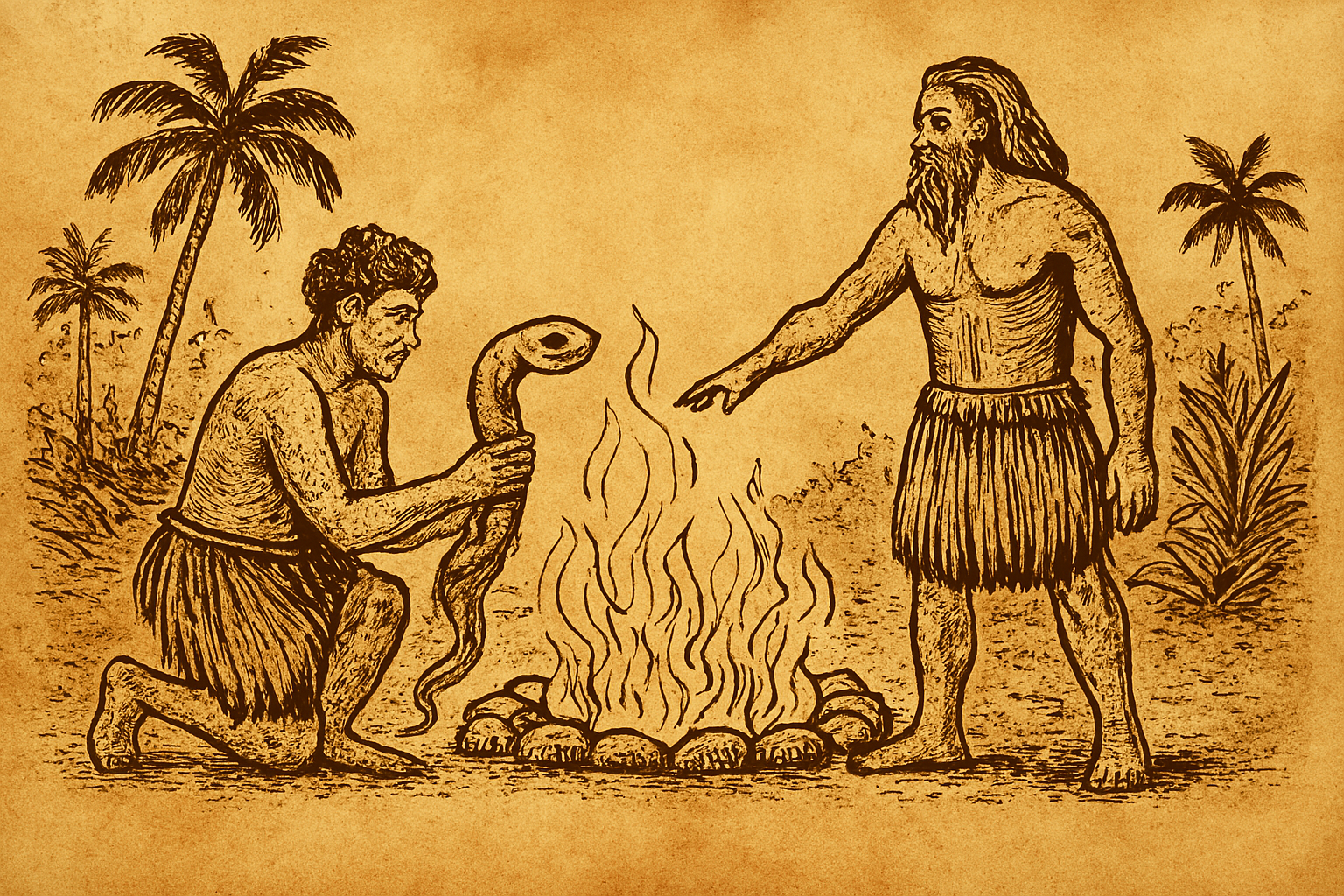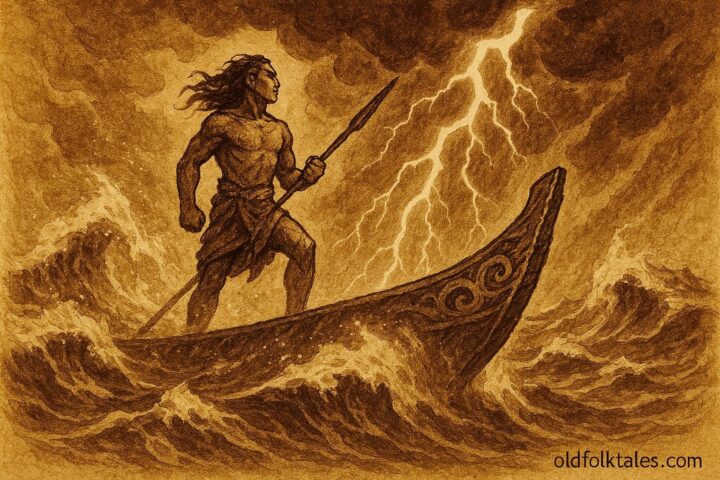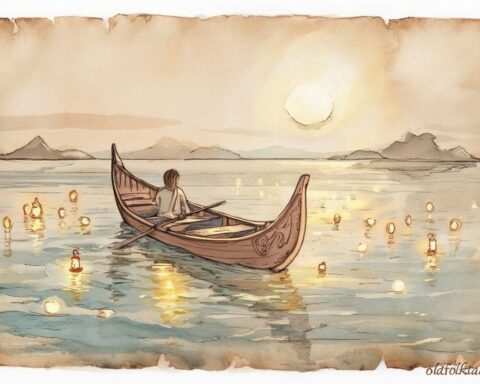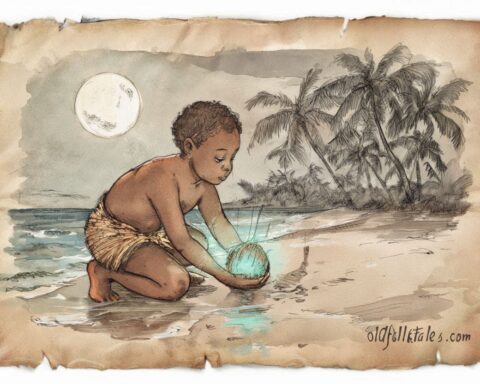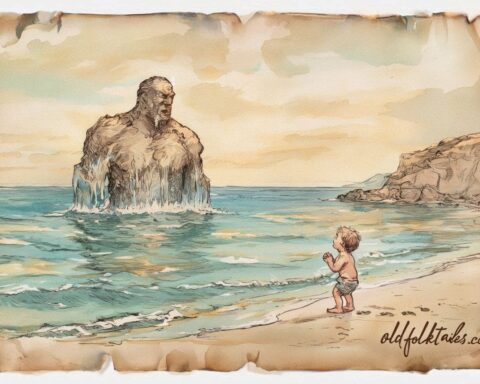The island of Beqa rises from the Pacific waters like a jewel of green and stone, its shores kissed by waves that have carried stories for generations. Among the villages scattered across this Fijian island, the Sawau people guard a secret that burns brighter than any flame the vilavilairevo, the sacred ceremony of firewalking. But this power, passed down through bloodlines like precious heirlooms, began not with human ambition, but with an act of unexpected mercy.
Long ago, when the ancestors still walked paths now overgrown and the old gods moved freely between worlds, a man ventured down to the mudflats at low tide. Some say he was a warrior of great renown, his chest marked with the honors of battle. Others insist he was an ordinary villager, a fisherman like any other, seeking the day’s catch with calloused hands and patient heart. The truth has been smoothed by time like stones in a river, but what followed changed the Sawau forever.
Click to read all Melanesian Folktales — rich oral storytelling from Papua New Guinea, Fiji, Solomon Islands, and Vanuatu
As the man waded through the dark, sucking mud, his foot struck something beneath the surface. Reaching down, he felt what seemed to be an eel slippery and strong, writhing in his grasp. With effort, he pulled it from its hiding place, expecting dinner for his family. But as the creature emerged into daylight, the air itself seemed to shimmer and change.
This was no ordinary eel. Before the man’s startled eyes, the creature revealed its true nature a spirit, an ancient god that had taken the form of the humble mud-dweller to move unseen through the mortal world. The spirit eel twisted in his hands, its voice rising like wind through bamboo, begging for release. “Let me go,” it pleaded, “and I will grant you a gift beyond measure.”
The man stood at the crossroads of choice, his fingers tight around divinity itself. He could have refused, could have demanded more, could have acted as many would when power presents itself wrapped in desperation. But whether warrior or fisherman, he possessed something rarer than strength compassion. He opened his hands and let the spirit slip free.
The eel god did not vanish into the mud as expected. Instead, it led the man inland to a clearing where villagers had prepared a ceremonial pit. Stones lay heating in a great fire, glowing red and orange like captured sunlight, radiating waves of heat that made the very air dance. The spirit eel spoke: “I will prove my gift to you.”
Before the man could protest, the creature leapt onto the bed of scorching stones. The man gasped, expecting to see flesh sear and smoke rise. But the spirit eel rested upon the fire-heated rocks as comfortably as if lying on cool sand. It was unburned, untouched, serene. “Now you,” the spirit commanded.
Fear and faith warred in the man’s heart. The stones shimmered with deadly heat. Yet he had shown mercy, and mercy had brought him to this moment. He stepped forward, feeling the waves of heat pushing against him like invisible hands. Then he placed his bare feet upon the stones.
There was no pain. No burning. The fire that should have consumed his flesh could not touch him. The gift was real, and it was his.
But such power came with sacred responsibility. The spirit eel laid down rules that could not be broken tabus that bound the gift to discipline and respect. Before any firewalking ceremony, those who would walk must abstain from certain activities, must observe strict dietary restrictions, avoiding foods that would break the spiritual protection. They must undergo ritual cleansings, washing away the everyday world to enter a sacred state. Only then, with body and spirit prepared according to the ancient covenant, could the descendants of that first man walk upon fire unharmed.
The gift passed down through the Sawau lineage like blood itself, from father to son, generation after generation. The ceremony became more than spectacle it became identity, a living connection to that moment of mercy in the mudflats. When European explorers first witnessed men walking calmly across beds of stones heated to over 600 degrees, they could scarcely believe their eyes. Word spread across oceans, drawing visitors who sought to understand what defied understanding.
Today, the vilavilairevo continues, though the world has changed around it. The stones still glow, the preparations still follow ancient patterns, and the Sawau still walk where others cannot. Tourism has brought attention and complexity, yet the heart of the ceremony remains: a promise kept across centuries, a gift given for mercy shown, a reminder that some powers cannot be taken only received with an open hand and a respectful heart.
Explore tales of ancestral spirits and island creation that connect people to the land and sea
The Moral Lesson
This legend teaches us that true power comes not from force or conquest, but from compassion and respect for the sacred. The warrior or fisherman received an extraordinary gift not because he was strong or clever, but because he chose mercy when he could have chosen otherwise. The strict tabus and preparations required for firewalking remind us that power without discipline and respect leads to destruction. When we honor our commitments, follow sacred responsibilities, and treat even the humble and vulnerable with compassion, we open ourselves to gifts beyond imagining.
Knowledge Check
Q1: Who gave the firewalking power to the Sawau people? A: A spirit eel (or eel god) granted the power to walk on fire after a man showed mercy by releasing it from capture in the mudflats of Beqa Island.
Q2: What did the man do to receive the gift of firewalking? A: He caught what appeared to be an eel in the mud, but when it revealed itself as a spirit and begged for release, he showed compassion and let it go free instead of keeping it.
Q3: What are the tabus associated with the vilavilairevo ceremony? A: Firewalkers must observe strict preparations including abstinence from certain activities, specific dietary restrictions, and ritual cleansings before they can safely walk on the heated stones.
Q4: What does the spirit eel symbolize in Fijian culture? A: The spirit eel represents the connection between the natural and supernatural worlds, and symbolizes how showing respect and mercy to all creatures even seemingly insignificant ones can bring sacred blessings and power.
Q5: Why did the firewalking ceremony become famous beyond Fiji? A: European visitors and explorers witnessed the ceremony and spread word of men walking unharmed across stones heated to extreme temperatures, eventually leading to increased tourism and global interest in this sacred Sawau tradition.
Q6: What is the deeper meaning of the preparations required for firewalking? A: The strict ritual preparations teach that supernatural gifts require responsibility, discipline, and respect. Power must be approached with proper spiritual preparation, not taken lightly or treated as mere entertainment.
Source: Adapted from Fijian oral traditions of the Sawau people of Beqa Island, as documented in anthropological and ethnographic literature on Pacific Island firewalking ceremonies.
Cultural Origin: Sawau people, Beqa Island, Fiji
